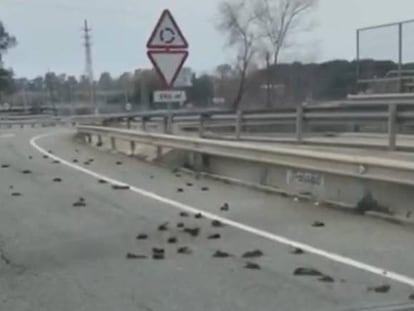Dozens of dead birds show up near Spanish chemical plant that suffered blast
Investigators are ruling out a toxic cloud, but have yet to explain what killed around 100 starlings in Tarragona

Authorities in Catalonia have opened an investigation to determine what caused the death of dozens of birds near a chemical plant in Tarragona.
The bodies of the starlings were discovered on Sunday afternoon, strewn across the highway that connects Tarragona with the municipality of Salou, in northeastern Spain. Close to 100 birds had dropped dead within a 10-meter radius.
Several phone calls alerted the emergency services, and officers from the Catalan department of agriculture were sent to the scene to take samples from the dead animals.

On Monday, authorities announced that they were analyzing the samples to clarify the cause of death, but ruled out that it was caused by a toxic cloud. Civil protection services said that there was no evidence that there had been any recent leak or chemical accident in the nearby industrial complex.
The bodies were found near the Iqoxe chemical plant, where an explosion in January killed three people and injured seven others. A sealed legal investigation was opened into the chemical explosion, but so far has not determined the cause of the blast.
Investigators said they were not ruling out the possibility that a vehicle killed the birds
Investigators said they were not ruling out the possibility that a vehicle killed the birds, a hypothesis that Cristina Sánchez, a representative of the Catalan branch of the environmental group SEO-Birdlife, describes as “strange.” Although starlings fly low to the ground in murmurations, which would make it easy for a bus or truck to run them down, the state of the birds’ bodies casts doubt on this theory.
“If they ruled out a toxic cloud, we have to believe it, but I find the possibility that they were run over strange, because the bodies do not look damaged,” she said. Sánchez says that it is important to determine whether the birds were poisoned by a different kind of pollutant, such as “a pesticide or something they ate in a nearby field.”
The environmental group Gepec, which is a strong advocate for air-quality tests in Tarragona, put a call out on social media for eyewitnesses and information that could shed light on the case.
Officers are also currently investigating a similar incident that took place in the city of Badalona, around 100 kilometers from Tarragona. On Monday Badalona city officials confirmed that 200 pigeons were found dead at different spots throughout the city. Municipal workers collected the bodies, which were found primarily in the areas of Pep Ventura and Sant Roc, as well as the remains of feed for analysis.
<⚠️ Ocells morts avui a l'autovia entre Salou i Tarragona, vora el polígon sud de la petroquímica, amb testimonis parlant també de fortes olors.🐦☠️🏭 Si tens qualsevol informació contrastada, escriu-nos al correu defensaambiental@gepec.cat. Gràcies!
— GEPEC-EdC (@gepecedc) February 16, 2020
📷: Autor/a desconegut/da pic.twitter.com/RZuVo8NfR3
English version by Melissa Kitson.
Tu suscripción se está usando en otro dispositivo
¿Quieres añadir otro usuario a tu suscripción?
Si continúas leyendo en este dispositivo, no se podrá leer en el otro.
FlechaTu suscripción se está usando en otro dispositivo y solo puedes acceder a EL PAÍS desde un dispositivo a la vez.
Si quieres compartir tu cuenta, cambia tu suscripción a la modalidad Premium, así podrás añadir otro usuario. Cada uno accederá con su propia cuenta de email, lo que os permitirá personalizar vuestra experiencia en EL PAÍS.
¿Tienes una suscripción de empresa? Accede aquí para contratar más cuentas.
En el caso de no saber quién está usando tu cuenta, te recomendamos cambiar tu contraseña aquí.
Si decides continuar compartiendo tu cuenta, este mensaje se mostrará en tu dispositivo y en el de la otra persona que está usando tu cuenta de forma indefinida, afectando a tu experiencia de lectura. Puedes consultar aquí los términos y condiciones de la suscripción digital.









































